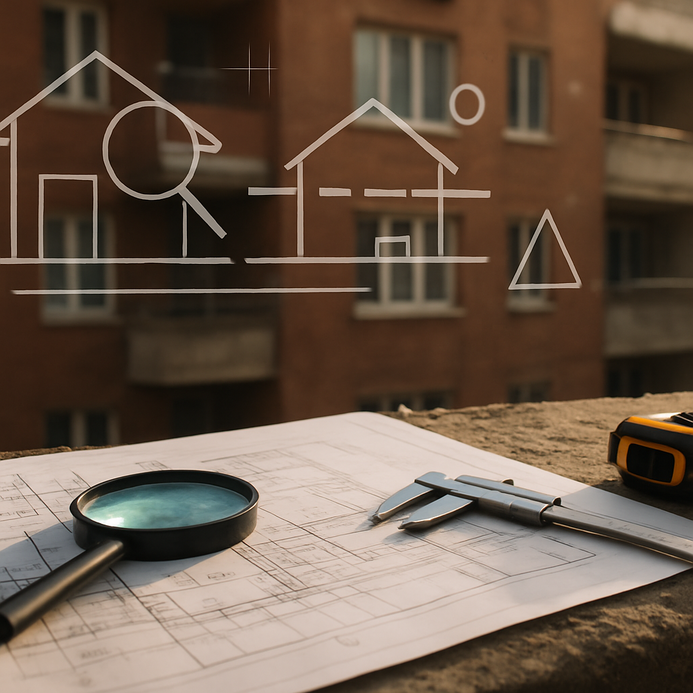First Home Loan Tips: Avoid These Common Mistakes
Purchasing your first home is an exciting achievement, but understanding home loans can feel overwhelming. From learning about different types of loans to figuring out terms like interest rates and loan duration, it can be a bit much. But with the right information and getting ready, getting your first home loan can go smoothly and be fulfilling. In this detailed guide, we’ll explain everything you need to know to start this exciting journey with confidence.

A home loan, often called a mortgage, is money you borrow from a bank or lender to buy a house. Instead of paying for the whole house right away, you make a smaller initial payment called a down payment and then pay back the loan with interest over a period of time.
- 1 Eligibility Criteria for a Home Loan: What Lenders Look For
- 2 Key Documents Required for Your First Home Loan Application
- 3 Interest Rates and EMI: How They Work in a Home Loan
- 4 Loan Tenure and Repayment: Choosing What’s Best for You
- 5 Down Payment and Loan-to-Value (LTV) Ratio: What to Know
- 6 Assessing Affordability: Can You Manage a Home Loan?
- 7 Conclusion
Types of Home Loans: Finding Right For Your First Home Loan
There is a diverse range of home loan options available to suit the varied needs and preferences of borrowers. Some of the most common types of home loans include:
There are several types of home loans. Some of them are as follows:-
- Fixed-rate loan: With a fixed-rate home loan, the interest rate remains constant throughout the entire tenure of the loan. This provides borrowers with stability and predictability, as their monthly payments remain unchanged, regardless of fluctuations in market interest rates.
- Adjustable-rate loan (ARM): In contrast to fixed-rate loans, floating-rate home loans have interest rates that fluctuate in line with market conditions. While initial interest rates may be lower than fixed-rate loans, borrowers are exposed to the risk of higher interest payments if market rates rise in the future.
- LAP (Loan against Property): A loan against property allows individuals to borrow money by mortgaging their existing residential or commercial property. LAP offers higher loan amounts and longer repayment tenures compared to other loan types, making it an attractive option for those in need of substantial funds.
- Reverse Mortgage loan: Designed for senior citizens, reverse mortgage loans enable homeowners to unlock the equity in their property and receive regular payments from the lender. The loan amount, along with accrued interest, is typically repaid by selling the property after the borrower’s demise or upon vacating the premises.

Eligibility Criteria for a Home Loan: What Lenders Look For
When applying for a home loan in India, lenders evaluate several aspects of your financial profile to assess eligibility. Key considerations include:
- Credit Score: A good credit score is essential for securing favourable loan terms and interest rates. Lenders assess the borrower’s creditworthiness based on their credit score and credit history.
- Income Stability: Lenders prefer borrowers with a stable source of income, such as salaried individuals or self-employed professionals. A consistent income stream indicates the borrower’s ability to repay the loan on time.
- Employment History: A steady employment record is viewed positively by lenders, as it reflects the borrower’s financial stability and repayment capacity.
- Down Payment: The down payment amount, expressed as a percentage of the property’s purchase price, is another key consideration. A higher down payment reduces the loan amount and lowers the borrower’s overall debt burden.
- Property Valuation: The value of the property being purchased is a crucial factor in determining the loan amount and eligibility. Lenders typically conduct a valuation of the property to assess its market worth.
Key Documents Required for Your First Home Loan Application
Gathering essential documents is a pivotal step in the home loan application process in India. Typical requirements include:
- Proof of Identity: Aadhar Card, Passport, or Voter ID.
- Income Documents: Salary slips, Income Tax Returns, and bank statements.
- Property Documents: Sale deed, property tax receipts, and NOC from relevant authorities.
- Employment Proof: Offer letter, appointment letter, or employment contract.
- Other Financial Documents: Details of existing loans, investments, and assets.
Organising and furnishing these documents promptly can expedite the application process and enhance approval chances.

Interest Rates and EMI: How They Work in a Home Loan
Interest rates and EMIs play a crucial role in determining the affordability of a home loan in India. The interest rate represents the cost of borrowing and can be fixed or floating, depending on the type of loan chosen by the borrower. The EMI, or Equated Monthly Instalment, comprises both the principal amount and the interest payable on the loan. Borrowers can use online EMI calculators to estimate their monthly repayment amount based on the loan amount, interest rate, and tenure.
Loan Tenure and Repayment: Choosing What’s Best for You
Choosing the right loan tenure is essential for managing the repayment of a home loan effectively. In India, home loan tenures typically range from 5 to 30 years, depending on the borrower’s preferences and financial circumstances. Opting for a shorter tenure results in higher EMIs but lower overall interest payments, whereas a longer tenure reduces the EMI burden but increases the total interest cost. Borrowers can also explore flexible repayment options offered by some lenders, such as part-prepayment or foreclosure, to accelerate the loan repayment process and save on interest costs.
Down Payment and Loan-to-Value (LTV) Ratio: What to Know
The down payment amount and Loan-to-Value (LTV) ratio are critical factors in the home loan approval process in India. The down payment is the initial contribution made by the borrower towards the purchase price of the property, while the LTV ratio represents the percentage of the property’s value financed by the lender. A higher down payment reduces the loan amount and lowers the LTV ratio, thereby improving the borrower’s chances of loan approval and securing favourable terms such as lower interest rates.

Assessing Affordability: Can You Manage a Home Loan?
In light of the increasing complexity of the real estate market and the significant financial commitment involved in homeownership, we propose the implementation of a robust affordability assessment system. This system aims to provide prospective homebuyers with a clear and comprehensive understanding of their financial readiness to purchase a home. By evaluating income stability, existing financial obligations, down payment capability, and anticipated homeownership costs, this assessment will empower individuals to make informed decisions aligned with their financial capabilities and long-term goals.
Our proposal includes the development of user-friendly tools, such as affordability calculators, and educational resources to support buyers in navigating the affordability assessment process. Additionally, collaboration with industry stakeholders, including lenders and real estate professionals, will ensure the seamless integration of affordability assessment into the home buying journey. By promoting financial literacy and transparency, this initiative seeks to foster responsible homeownership and mitigate the risk of financial strain for buyers in the real estate market.

Conclusion
In conclusion, navigating the process of securing a home loan in India requires careful planning, thorough research, and a clear understanding of the various factors involved. By familiarising yourself with the different types of home loans available, assessing your eligibility, gathering the necessary documents, and exploring repayment options, you can make informed decisions that align with your financial goals and aspirations of homeownership. Remember to consult with financial advisors or mortgage experts if you have any doubts or questions along the way. With the right knowledge and preparation, you can embark on your journey towards homeownership with confidence and peace of mind.













